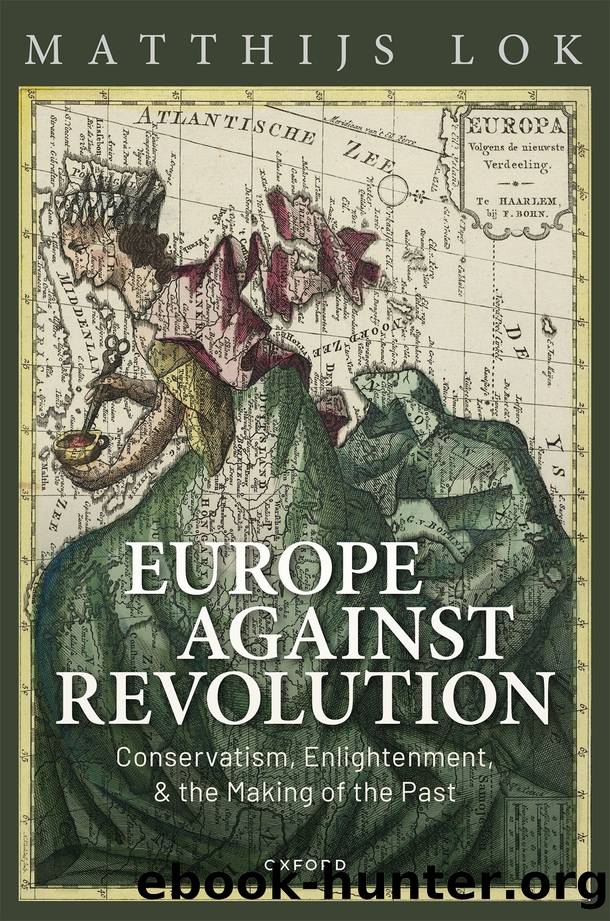Europe against Revolution by Matthijs Lok

Author:Matthijs Lok [Lok, Matthijs]
Language: eng
Format: epub
ISBN: 9780198872153
Publisher: OUP Oxford
Published: 2023-02-10T00:00:00+00:00
8. Principles for a European Peace
The sudden and unexpected collapse of the Empire in the spring of 1814 was experienced by Vogt as a traumatic turning point in European history as well as in his own life.118 The optimism and self-confidence that had characterized Vogtâs writings in the first decennium of the nineteenth century receded in his publications of the year 1814â15.119 Like many contemporaries in these years of regime change, he felt the need to justify himself and his past behaviour as well as the positions he had taken in his earlier writings. In his Historisches Testament (Historical Testament, 3 vol. 1814â15), Vogt looked, reflectively, back on his life as historian and publicist. Although he would live and write for more than another two decades, he gave here the impression of an old and disillusioned man. He wrote about himself as a man who had failed in his endeavours, and his âtestamentâ was meant for younger generations to complete the task Vogt had set himself but had failed in its execution as a result of the revolutionary years.120 Whereas many contemporaries immediately downplayed their allegiance to Napoleon after his fall, Vogt in his Testament, remarkably, still praised the French emperor, calling him a âgeniusâ.121 He also proudly testified that he had witnessed Napoleonâs coronation in Paris. Tellingly, however, the work avoided explicit comments on contemporary politics.122 Vogt presented Napoleon primarily as an apolitical supporter of the arts and as a maecenas of European civilization, echoing Napoleonâs later self-representation in Le Mémorial de Sainte-Hélène.123
The cataclysmic political events of 1814â15 also led Vogt to reflect more in depth on the nature and meaning of the âhistoryâ of humanity.124 âHistoryâ, according to Vogt in a more religious vein, should be regarded as a theodicy: divine will was revealed through world history. Treatises on world, and especially European, history could be compared to the holy books in the sense that they gave information about providential intentions. The historian was like a priest, whose duty was to explain the higher meaning of the world by the interpretation of history.125 Divine Providence had changed the course of human history at certain key moments. The destruction of the ancient world was such a turning point. The French Revolution should also be seen in that light. The apocalyptic destruction caused by this Revolution, also enabled, for Vogt, the regeneration of a corrupted European civilization, an argument later also made by Joseph de Maistre.126
Like Feller, Vogt provided a chronology of human history in twenty-eight epochs, starting with the biblical creation and ending with the outbreak of the French Revolution. But in contrast to Feller, Vogt still explicitly tried to fuse providential and Enlightenment narratives. He did not examine the biblical story of creation uncritically but instead emphasized, in a Pyrrhonic vein, the lack of sources and the impossibility of attaining indisputable historical knowledge on the earliest human history.127 World history for Vogt was evidently mainly European history with the addition of parts of the history of the Near East and the Arabic and Islamic worlds.
Download
This site does not store any files on its server. We only index and link to content provided by other sites. Please contact the content providers to delete copyright contents if any and email us, we'll remove relevant links or contents immediately.
Room 212 by Kate Stewart(5127)
The Crown by Robert Lacey(4817)
Endurance: Shackleton's Incredible Voyage by Alfred Lansing(4785)
The Iron Duke by The Iron Duke(4360)
The Rape of Nanking by Iris Chang(4215)
Joan of Arc by Mary Gordon(4115)
Killing England by Bill O'Reilly(4005)
Say Nothing by Patrick Radden Keefe(3988)
I'll Give You the Sun by Jandy Nelson(3448)
Shadow of Night by Deborah Harkness(3370)
Hitler's Monsters by Eric Kurlander(3343)
Mary, Queen of Scots, and the Murder of Lord Darnley by Alison Weir(3210)
Blood and Sand by Alex Von Tunzelmann(3205)
Eleanor & Park by Rainbow Rowell(3178)
Darkest Hour by Anthony McCarten(3133)
Margaret Thatcher: The Autobiography by Thatcher Margaret(3083)
Book of Life by Deborah Harkness(2939)
Red Famine: Stalin's War on Ukraine by Anne Applebaum(2935)
The One Memory of Flora Banks by Emily Barr(2864)
